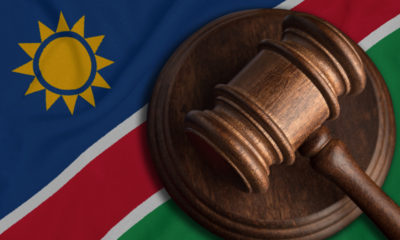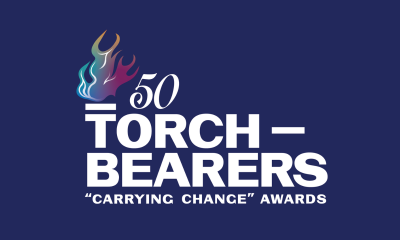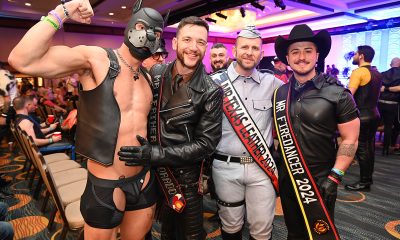Africa
Namibian Supreme Court hears three LGBTQ rights cases
Consensual same-sex sexual relations remain criminalized
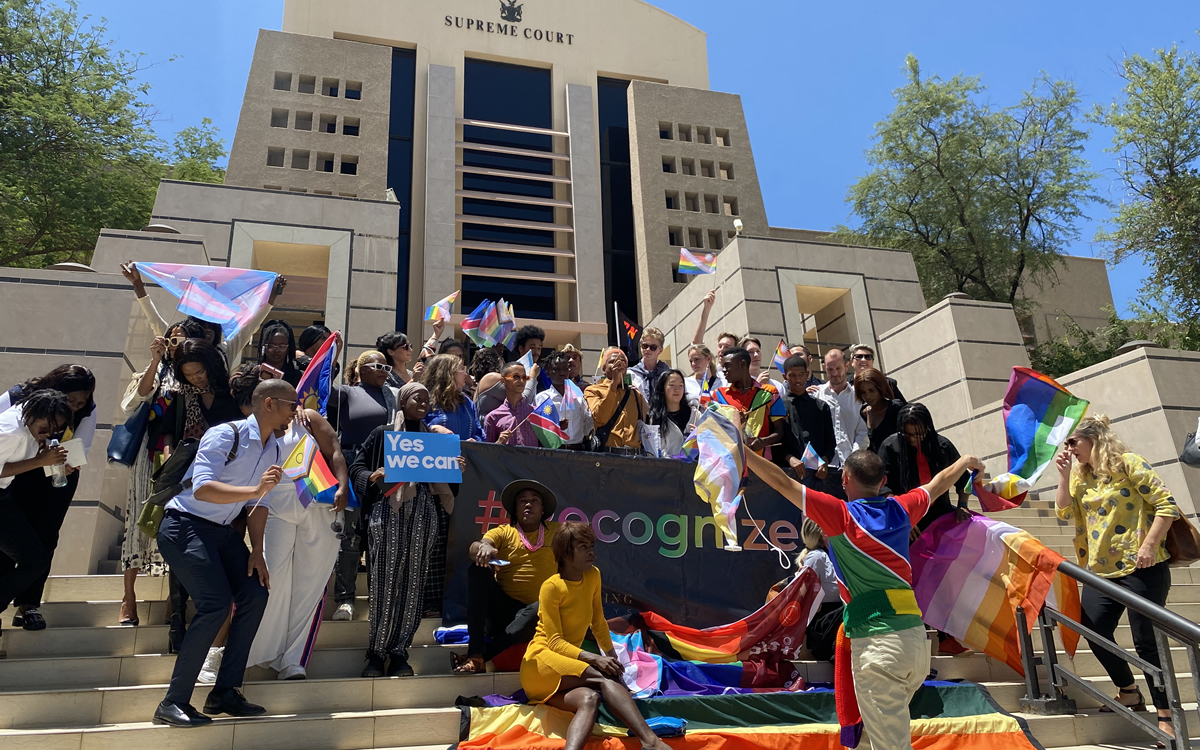
The Supreme Court of Namibia will soon issue rulings in three pivotal cases involving LGBTQ and intersex people that will set a precedent for the recognition of same-sex marriages and spousal immigration rights for non-Namibian partners.
Furthermore, a case is soon to be heard in the country’s high court that will challenge the southern African nation’s antiquated sodomy law.
These cases have incited public debate around LGBTQ and intersex rights in a country where homosexuality is a controversial and polarizing subject.
This is the first time since 2001 that Namibia’s highest court will hear cases regarding same-sex relationships. It is also the first time the high court will hear arguments regarding the sodomy law.
The first hearing, which took place on March 3, was the joint cases of Digashu and Seiler-Lilles versus the government.
The applicants — both foreign nationals married to Namibian citizens — in both cases are seeking recognition of their marriages concluded outside Namibia in order to access spousal immigration rights such as permanent residence and employment authorization.
The second hearing, which took place on March 6, was in the case of a Namibian man married to a Mexican man seeking citizenship by descent for their children born via surrogate. The government has demanded DNA testing to prove that the Namibian national is the biological father to the children.
In the last case, a gay Namibian man is not only challenging the constitutionality of the country’s sodomy law but also the prohibition of “unnatural sexual offenses.”
While the cases represent a crucial moment for the country’s LGBTQ and intersex community and their rights, individual people and families fighting a fight bigger than they had foreseen are at the center of these cases.
Marriage, immigration and the law
South African citizen Daniel Digashu married Namibian national Johann Potgieter in South Africa in 2015. The couple and their son moved to Namibia in 2017.
While the move was favorable for the family, the law around same-sex marriage was not.
Digashu’s first encounter with the Home Affairs and Immigration Ministry was not to have them officially recognize his marriage. He was applying for a permit allowing him to work in the country in the company that he jointly started with his husband.
“We’ve always had a dream to live on a farm and run this tourism company. We registered the company first, about six months before we officially moved,” Digashu said.
He said the ministry advised him against applying for permanent residency because the country does not recognize his marriage. Officials instead told him to seek a work permit.
Despite assurances from the ministry’s personnel, the application was denied. Digashu filed an appeal, and that was denied too.
From this moment to today, Digashu has lived a life in limbo.
Due to the ongoing court cases, he is able to renew his visitor’s visa every few months. This, he said, comes with exhausting administrative costs that legal fees exacerbate.
Digashu said the process has put psychological, emotional and financial strain on his family.
“Prior to finding funding it had been quite difficult financially. It is not something that a lot of people would afford. I don’t think we even could afford it. That’s why we sought out and looked for funding and luckily we found that,” he said.
As they await the judgment of their hearing, everything remains the same for Digashu and his family: His husband remains the sole breadwinner as Digashu himself still cannot work.
Namibian citizen Anette Seiler and her German wife Anita Seiler-Lilles face the same dilemma.
Neither expected to become cornerstones of the advocacy around marriage equality and LGBTQ and intersex rights in Namibia.
“We didn’t plan to come to Namibia in the early 2000s,” said Seiler. “We thought we might want to come back when Anita didn’t have to work anymore, and that would be many years later. So, we didn’t think so much in terms of gay rights in Namibia at that time.”
“It was a very personal thing for us to get married. We were not active in Namibia or Germany in the gay community,” she added.
Both couples have received copious amounts of support from the local LGBTQ and intersex community and civil society as they fight to be afforded the same spousal rights that would be granted to opposite-sex couples.
Citizenship by descent and the right to family
As Namibia grapples with the recognition of same-sex marriages, the right to family and protections of them is another matter that has come under scrutiny.
Namibian citizen Phillip Lühl and his husband, Mexican national Guillermo Delgado, are fighting for their children born via surrogacy to be granted Namibian citizenship by descent.
Delgado and Lühl say they are fighting for their children’s birthright.
While both fathers are listed on the children’s South African birth certificates, the Namibian government has demanded DNA proof that Lühl is the biological parent of the children.
“The fact is that any other South African birth certificate is accepted but in our case it’s not because we’re of the same sex. In the case of a heterosexual couple, nobody will ever ask for any proof or dispute the validity of the document, but in our case it is,” Lühl said.
The children have been granted Mexican citizenship by descent after a rigorous process that ended with the country’s Foreign Affairs Ministry granting it.
“They initially were not favorable but concluded that Mexico would recognize a process that was duly and procedurally done in a constituency that they recognize, namely South Africa,” Delgado explained.
The family nevertheless plans to stay in Namibia and continue to fight the government for their children’s birthright and the recognition of their family.
Their case scrutinizes the ambit of the Namibian Constitution, which affords all its citizens protection against discrimination and the right to family.
‘Apartheid-era’ sodomy law
In the final case, Namibian gay activist Friedel Dausab has filed a constitutional challenge against the common law crime of sodomy and the prohibition of “unnatural” sexual acts.
Dausab brought a case against the government in June 2020 stating that the law promotes stigma and exclusion, and instigates the criminalization of consensual same-sex sexual acts between men.
Dausab argues that the offenses under the law are incompatible with the constitutional rights to equality, dignity, privacy, freedom of association and freedom of expression. He also argues that the crime of “unnatural sexual offenses” is too vague to be compatible with the constitution.
“I am challenging these laws as a lifelong and dedicated activist because I am acutely aware that criminalization is a clear obstacle to living a full, open, honest and healthy life,” he said.
Namibian Attorney General Festus Mbandeka in a recent affidavit he submitted to the high court said same-sex sexual conduct is immoral and unacceptable to many Namibians. Mbandeka further denied the existence of the sodomy law stigmatizes gay men.
“If these men suffer any stigma it is in consequence of their choice to engage in sexual conduct considered to be morally taboo in our society,” Mbandeka said.
While it is reported that 64 sodomy-related arrests were made between 2003-2019, the offenses are rarely enforced. The country’s Criminal Procedure Act 51 of 1977 nevertheless lists “sodomy” as a Schedule 1 offense.
The U.K.-based organization Human Dignity Trust says this listing means that either a police officer or an ordinary citizen can arrest anyone who is reasonably suspected of having committed the offense without needing a warrant. It is legal to use lethal force to kill them if the suspect attempts to evade arrest.
Namibia remains one of the few countries in southern Africa that is yet to abolish its sodomy law. Angola, Botswana, Lesotho, Mozambique and South Africa have already done so.
Egypt
Iran, Egypt object to playing in Seattle World Cup ‘Pride Match’
Game to take place on June 26

Iran and Egypt have objected to playing in a “Pride Match” that will take place in Seattle during the 2026 World Cup.
The Egyptian Football Association on Tuesday said it told FIFA Secretary General Mattias Grafström in a letter that “it categorically rejects holding any activities related to supporting (homosexuality) during the match between the Egyptian national team and Iran, scheduled to be held in Seattle, USA, on June 26, 2026, in the third round of the group stage of the 2026 World Cup.” Football Federation Islamic Republic of Iran President Mehdi Taj told ISNA, a semi-official Iranian news agency that both his country and Egypt “protested this issue.”
The 2026 World Cup will take place in the U.S., Canada, and Mexico. The draw took place at the Kennedy Center on Dec. 5.
Iran is among the handful of countries in which consensual same-sex sexual relations remain punishable by death.
The State Department’s 2023 human rights report notes that while Egyptian law “did not explicitly criminalize consensual same-sex sexual activity, authorities regularly arrested and prosecuted LGBTQI+ persons on charges including ‘debauchery,’ prostitution, and ‘violating family values.’” Egyptian authorities “also reportedly prosecuted LGBTQI+ individuals for ‘misuse of social media.’”
“This resulted in de facto criminalization of same-sex conduct and identity,” notes the report.
The 2024 human rights report the State Department released earlier this year did not include LGBTQ-specific references.
Soccer has ‘unique power to unite people across borders, cultures, and beliefs’
The June 26 match between Iran and Egypt coincides with Seattle Pride. The Washington Post reported the Seattle FIFA World Cup 2026 Local Organizing Committee decided to hold the “Pride Match” before last week’s draw.
“As the Local Organizing Committee, SeattleFWC26’s role is to prepare our city to host the matches and manage the city experience outside of Seattle Stadium,” said SeattleFWC26 Vice President of Communications Hana Tadesse in a statement the committee sent to the Washington Blade on Wednesday. “SeattleFWC26 is moving forward as planned with our community programming outside the stadium during Pride weekend and throughout the tournament, partnering with LGBTQ+ leaders, artists, and business owners to elevate existing Pride celebrations across Washington.”
“Football has a unique power to unite people across borders, cultures, and beliefs,” added Tadeese. “The Pacific Northwest is home to one of the nation’s largest Iranian-American communities, a thriving Egyptian diaspora, and rich communities representing all nations we’re hosting in Seattle. We’re committed to ensuring all residents and visitors experience the warmth, respect, and dignity that defines our region.”
The 2034 World Cup will take place in Saudi Arabia.
Consensual same-sex sexual relations remain punishable by death in the country. The 2022 World Cup took place in neighboring Qatar, despite concerns over the country’s anti-LGBTQ rights record.
Eswatini
PEPFAR delivers first doses of groundbreaking HIV prevention drug to two African countries
Lenacapavir now available in Eswatini and Zambia.
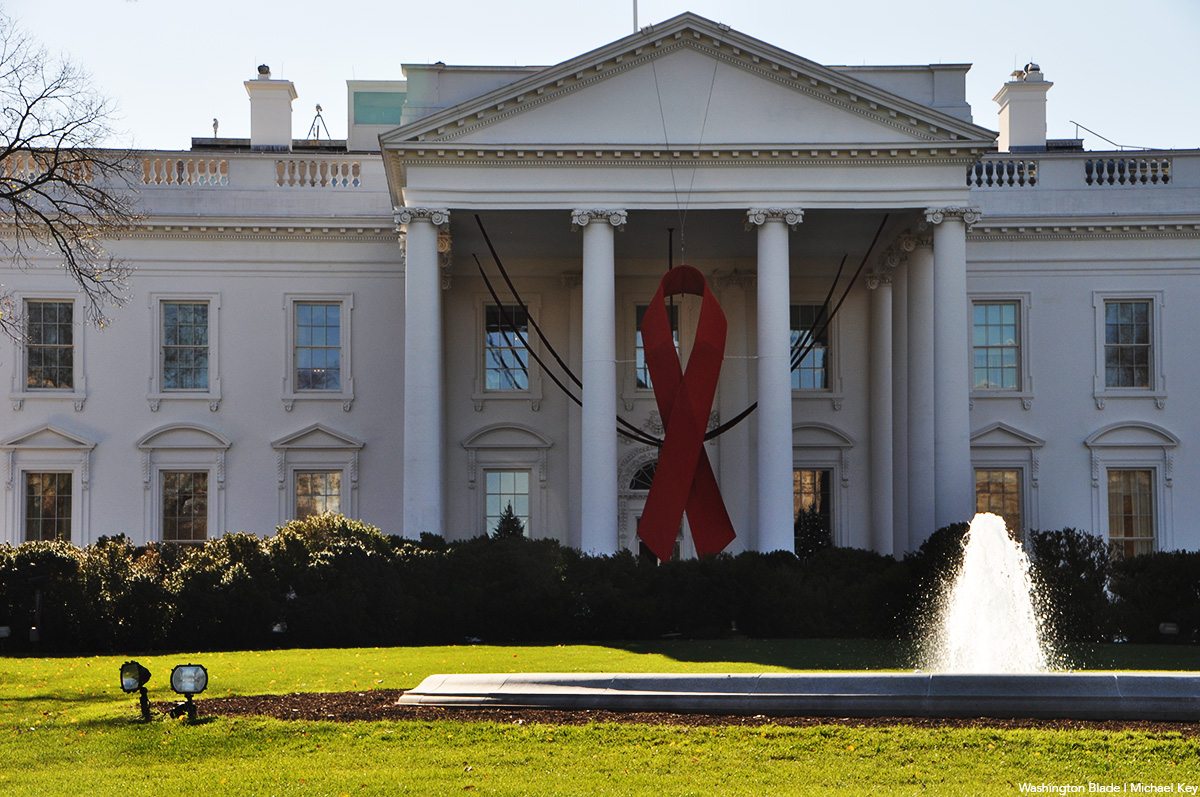
The State Department on Tuesday announced PEPFAR has delivered the first doses of a groundbreaking HIV prevention drug to two African countries.
The lenacapavir doses arrived in Eswatini and Zambia.
The State Department in September unveiled an initiative with Gilead Sciences to bring lenacapavir “to market in high-burden HIV countries.”
Lenacapavir users inject the drug twice a year.
The State Department in its September announcement noted everyone who participated in Gilead’s clinical trials remained HIV negative. It also said lenacapavir “has the potential to be particularly helpful for pregnant and breastfeeding mothers, as it safely protects them during and after pregnancy to prevent mother-to-child transmission.”
“In our new America First Global Health Strategy, the Department of State is establishing a first-of-its-kind innovation fund to support American-led research, market-shaping, and other dynamic advancements in global health,” said PEPFAR on Tuesday in a press release.
“The arrivals of the first doses of lenacapavir in Eswatini and Zambia mark an important milestone in HIV prevention and reflect our commitment to supporting communities with the greatest need,” added Gilead CEO Daniel O’Day. “For the first time, a new HIV medicine is reaching communities in sub-Saharan Africa in the same year as its U.S. approval.”
The September announcement came against the backdrop of widespread criticism over the Trump-Vance administration’s reported plans to not fully fund PEPFAR and to cut domestic HIV/AIDS funding. The Washington Blade has previously reported PEPFAR-funded programs in Kenya and other African countries have been forced to curtail services or even close because of U.S. funding cuts.
Botswana
The first courageous annual Palapye Pride in Botswana
Celebration was a beginning rooted in courage, community, and love.
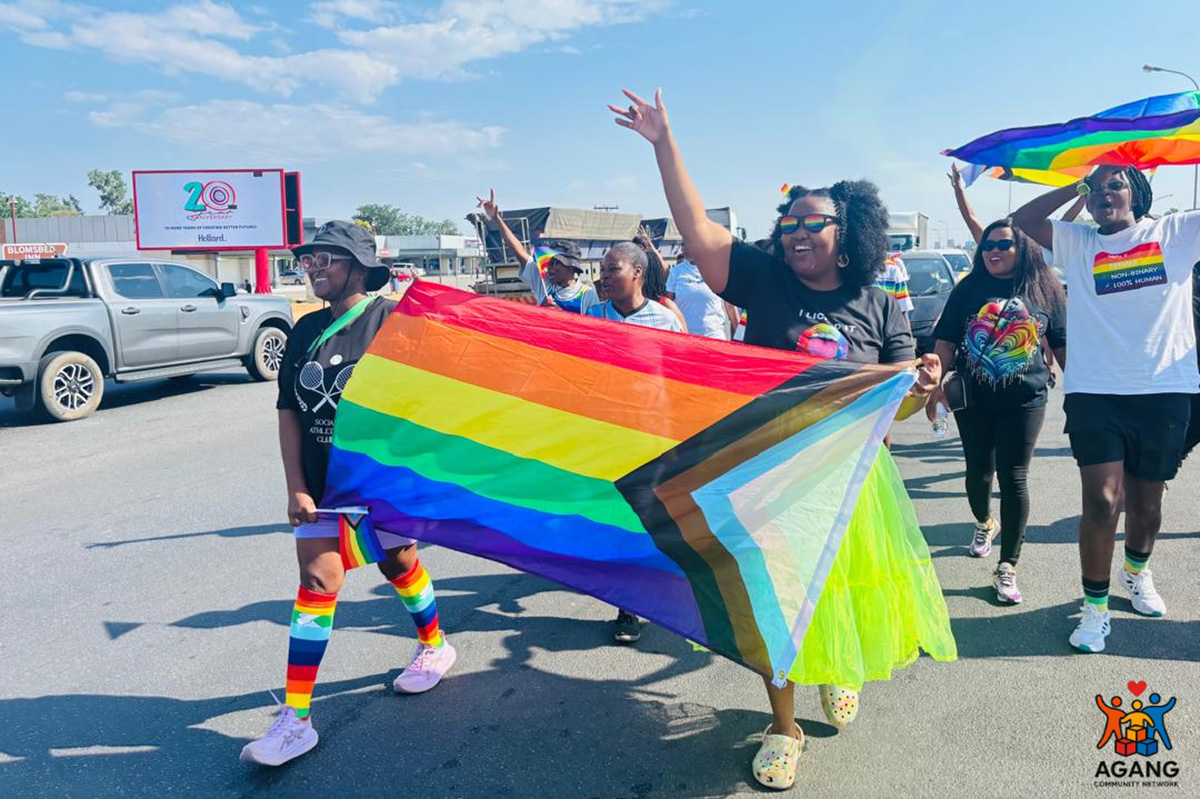
“When the sun rose on 1 Nov., 2025, Pride morning in Palapye, the open space where the march was scheduled to begin was empty. I stood there trying to look calm, but inside, my chest felt tight. I was worried that no one would come. It was the first-ever Pride in Palapye, a semi-urban village where cultural norms, religious beliefs, and tradition are deeply woven into everyday life.
I kept asking myself if we were being naive. Maybe people weren’t ready. Perhaps fear was going to win. For the first 30 minutes, it was me, a couple of religious leaders and a handful of parents. That was it. The silence was loud, and every second felt like it stretched into hours. I expected to see the queer community showing up in numbers, draped in color and excitement. Instead, only the wind was moving.
But slowly, gently, just like courage often arrives, people started to show up with a rainbow flag appearing from behind a tree and a hesitant wave from someone standing at a distance.
That’s when I understood that people weren’t late, just that they were afraid. And their fear made sense. Showing up openly in a small community like Palapye is a radical act. It disrupts silence. It challenges norms. It forces visibility. Visibility is powerful, but it is never easy. We marched with courage, pulling from the deepest parts of ourselves. We marched with laughter that cracked through the tension. We marched not because it was easy, but because it was necessary,” narrates activist Seipone Boitshwarelo from AGANG Community Network, which focuses on families and friends of LGBTIQ+ people in Botswana. She is also a BW PRIDE Awards nominee for the Healing and Justice Award, a category which acknowledges contributions to wellness, mental health, and healing for the LGBTIQ+ community across Botswana.
Queer Pride is Botswana Pride!
Pride is both a celebration and a political statement. It came about as a response to systemic oppression, particularly the criminalization and marginalization of LGBTIQ+ people globally, including in Botswana at some point. It is part of the recognition, equality, and assertion of human rights. It also reminds us that liberation and equality are not automatically universal, and continued activism is necessary. A reminder of the famous saying by Fannie Lou Hamer, “Nobody is free until everybody’s free.”
The 2023 Constitutional Review process made one thing evident, which is that Botswana still struggles to acknowledge the existence of LGBTIQ+ people as full citizens. Instead of creating a democratic space for every voice, the process sidelined and erased an entire community. In Bradley Fortuin’s analysis of the Constitutional review and its final report, he highlighted how this erasure directly contradicts past court decisions that explicitly affirmed the right of LGBTIQ+ people to participate fully and openly in civic life. When the state chooses to ignore court orders and ignore communities, it becomes clear that visibility must be reclaimed through alternative means. This is why AGANG Community Network embarked on Palapye Pride. It is a radical insistence on belonging, rooted in community and strengthened through intersectionality with families, friends, and allies who refuse to let our stories be erased.
Motho ke motho ka batho!
One of the most strategic decisions made by the AGANG Community Network was to engage parents, religious leaders, and local community members, recognizing their value in inclusion and support. Thus, their presence in the march was not symbolic, but it was intentional.
Funding for human rights and LGBTIQ+ advocacy has been negatively impacted since January 2025, and current funding is highly competitive, uneven and scarce, especially for grassroots organizations in Botswana. The Palapye Pride event was not funded, but community members still showed up and donated water, a sound system, and someone even printed materials. This event happened because individuals believed in its value and essence. It was a reminder that activism is not always measured in budgets but in willingness and that “motho ke motho ka batho!” (“A person is a person because of other people!”).
Freedom of association for all
In March 2016, in the the Attorney General of Botswana v. Rammoge and 19 Others case, also known as the LEGABIBO registration case, the Botswana Court of Appeal stated that “members of the gay, lesbian, and transgender community, although no doubt a small minority, and unacceptable to some on religious or other grounds, form part of the rich diversity of any nation and are fully entitled in Botswana, as in any other progressive state, to the constitutional protection of their dignity.” Freedom of association, assembly, and expression is a foundation for civic and democratic participation, as it allows all citizens to organize around shared interests, raise their collective voice, and influence societal and cultural change, as well as legislative reform.
The Botswana courts, shortly after in 2021, declared that criminalizing same-sex sexual relations is unconstitutional because they violated rights to privacy, liberty, dignity, equality, and nondiscrimination. Despite these legal wins, social stigma, cultural, and religious opposition continue to affect the daily lived experience of LGBTIQ+ people in Botswana.
The continuation of a declaration
AGANG Community Network is committed to continuing this work and creating safe and supportive spaces for LGBTIQ+ people, their families, friend, and allies. Pride is not just a day of fun. It is a movement, a declaration of queer existence and recognition of allyship. It is healing and reconciliation while amplifying queer joy.
Seipone Boitshwarelo is a feminist, activist, social justice healer, and founder of AGANG Community Network. Bradley Fortuin is a social justice activist and a consultant at the Southern Africa Litigation Center.
-

 U.S. Supreme Court5 days ago
U.S. Supreme Court5 days agoSupreme Court hears arguments in two critical cases on trans sports bans
-

 Commentary5 days ago
Commentary5 days agoHonoring 50 queer, trans women with inaugural ‘Carrying Change’ awards
-

 District of Columbia5 days ago
District of Columbia5 days agoRuby Corado sentenced to 33 months in prison
-

 a&e features5 days ago
a&e features5 days agoVisible and unapologetic: MAL brings the kink this weekend





